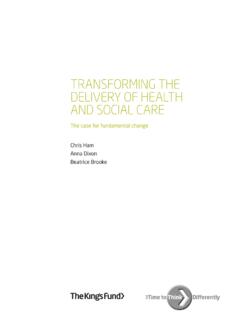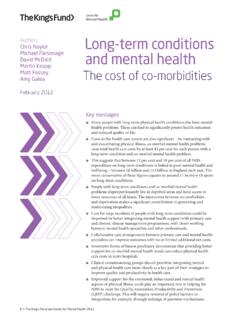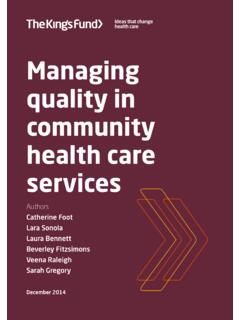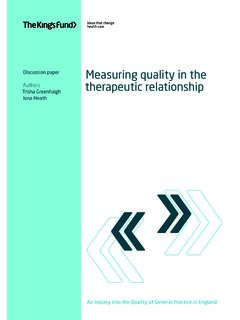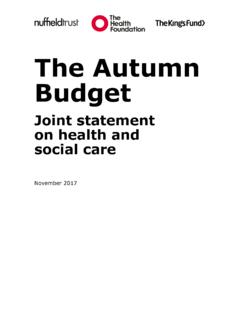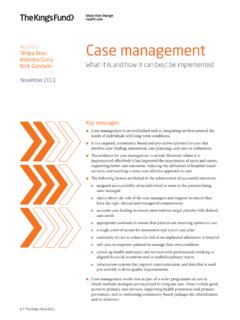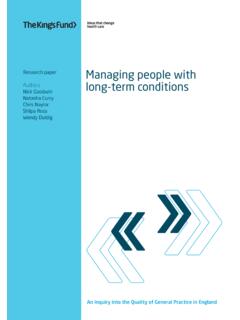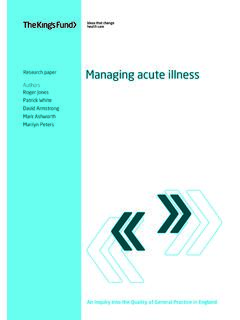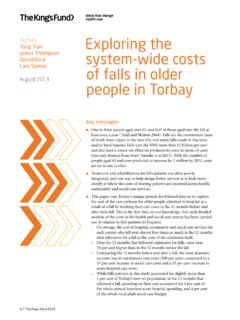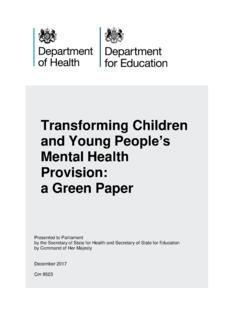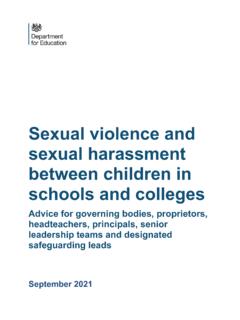Transcription of Supporting nurses and midwives to deliver high-quality care
1 The courage of compassionSupporting nurses and midwives to deliver high-quality careMichael West, Suzie Bailey, Ethan WilliamsSummary September 2020 Overview The Covid-19 pandemic has put the UK health and care workforce under unprecedented pressure. The workforce had been struggling to cope even before the pandemic took hold. Staff stress, absenteeism, turnover and intentions to quit had reached alarmingly high levels in 2019, with large numbers of nurse and midwife vacancies across the health and care system. And then the pandemic struck. The impact of the pandemic on the nursing and midwifery workforce has been unprecedented and will be felt for a long time to come.
2 The crisis has also laid bare and exacerbated longstanding problems faced by nurses and midwives , including inequalities, inadequate working conditions and chronic excessive work pressures. The health and wellbeing of nurses and midwives are essential to the quality of care they can provide for people and communities, affecting their compassion, professionalism and effectiveness. This review investigated how to transform nurses and midwives workplaces so that they can thrive and flourish and are better able to provide the compassionate, high-quality care that they wish to offer. Nurse and midwives have three core work needs that must be met to ensure wellbeing and motivation at work, and to minimise workplace stress: autonomy, belonging and contribution.
3 This report sets out eight key recommendations designed to meet these three core work needs. These recommendations focus on: authority, empowerment and influence; justice and fairness; work conditions and working schedules; teamworking; culture and leadership; workload; management and supervision; and learning, education and courage of compassionSummary 2 ContextEven before the outbreak of the Covid-19 pandemic, the health and social care workforce across the United Kingdom was struggling to cope. One of the greatest challenges is in nursing, with 43,590 NHS nurse vacancies in England; 3,607 nurse and midwife posts vacant in Scotland; 2,488 nursing, health care assistant and nursing assistant vacancies across health and social care in Northern Ireland; and an estimated 1,651 nursing vacancies in the Welsh King s Fund has identified a large and growing gap between capacity and demand in district nursing services, with staff reporting feeling broken , exhausted and on their knees.
4 There has been a 35 per cent reduction in health visitors in England s NHS between 2015 and 2020 and a 38 per cent decrease in learning disability nursing numbers between September 2010 and September adult social care sector has also been under huge pressure and faces many of the same issues as the NHS. In all four UK countries there are high levels of vacancies for nursing in social care . In adult social care in England, the registered nurse vacancy rate before the Covid-19 pandemic was 12 per cent, and registered nurse was one of the only job roles in adult social care to see a significant decrease (30 per cent) since 2012 stress, absenteeism, presenteeism, turnover and intentions to quit had reached alarming levels among nurses and midwives in late 2019.
5 The UK-wide Royal College of Nursing (RCN) employment survey 2019 suggested that nearly a quarter of nurses and midwives were looking for a job outside the NHS. In the 2019 English NHS national Staff Survey, 44 per cent of nurses and midwives indicated that they had been unwell as a result of work-related stress in the previous 12 months, the highest percentage reporting this in the past five years. More than half reported attending work in the past three months despite not feeling well enough to perform their duties. And then the Covid-19 pandemic health and wellbeing of nurses and midwives are essential to the quality of care they can provide for people and communities, affecting their compassion, professionalism and effectiveness.
6 Ensuring that working conditions across all settings in primary , secondary, mental health , community and social care are Supporting nurses and midwives in their work is fundamental to ensuring the best The courage of compassionSummary 3outcomes for people who need health and care services. This report focuses on their work life experience and what needs to be done to address the problems they requires the courage of compassionate leadership from all leaders, at every level of our health and care systems across the four UK countries, to engage with and successfully address the challenges that nursing and midwifery services face.
7 Doing so is critical to our ability to care for the health and wellbeing of everyone across the United researchOur research explored the causes and consequences of poor mental health and wellbeing among nurses and midwives , and sought to identify solutions to these issues and examples of good practice. The scope of the review covered all nursing and midwifery staff and students, including health care assistants and nursing associates, across the review team gathered evidence through a literature review, secondary analysis of quantitative data, focus groups with nursing and midwifery staff and semi-structured interviews with stakeholders from across the four UK countries.
8 The interviews were conducted with nursing and midwifery staff at a range of levels of seniority, representative bodies and royal colleges, government departments in each UK country, regulators and improvement bodies, and workforce leaders at organisational, regional and national report focuses on how to develop good work environments for nurses and midwives by changing the workplace factors that affect their wellbeing and effectiveness at work, rather than focusing on ways to help them cope with negative working environments or providing treatment when they become unwell. Efforts must be focused on changing the factors that cause stress rather than only dealing with report was commissioned by the RCN Foundation.
9 The views in this report are those of the authors and all conclusions are the authors courage of compassionSummary 4 ABC of nurses and midwives core work needs To ensure wellbeing and motivation at work, and to minimise workplace stress, research evidence suggests that people have three core needs: autonomy the need to have control over their work lives, and to be able to act consistently with their values belonging the need to be connected to, cared for, and caring of others around them at work, and to feel valued, respected and supported contribution the need to experience effectiveness in what they do and deliver valued three must be met for people to flourish and thrive at work.
10 The review identified eight key areas where action is needed to ensure that these three core needs are met for nurses and midwives (see Figure 1, below).Figure 1: The ABC framework of nurses and midwives core work needsThe ABC of nurses and midwives core needsAutonomy The need to have control over one s work life, and to be able to act consistently with one s values Belonging The need to be connected to, cared for by, and caring of colleagues, and to feel valued, respected and supportedContributionThe need to experience effectiveness in work and deliver valued outcomesl Authority, empowerment and influenceInfluence over decisions about how care is structured and delivered.
